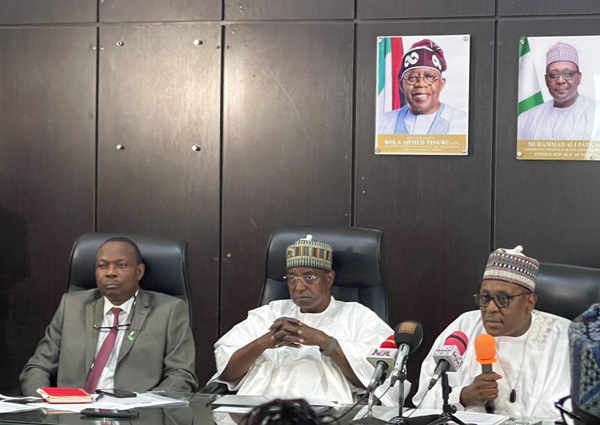
Nigeria has reaffirmed its leadership role in the global response to antimicrobial resistance (AMR) as senior government officials, technical experts and development partners gathered on Tuesday, July 1, 2025, in Abuja for the inaugural meeting of the Ministerial Advisory Committee on the planning of the 5th Global High-Level Ministerial Conference on AMR, scheduled for June 29 – 30, 2026.
In his opening remarks, the Minister of Health and Social Welfare, Prof. Ali Pate underscored the significance of Nigeria’s hosting of the conference, describing it as a historic opportunity to drive momentum for a global One Health approach. He noted that AMR poses serious risks across human, animal and environmental systems, and only an integrated response can effectively address these challenges.
“Our hosting of this conference signals Nigeria’s readiness to lead, not just in Africa, but globally, by advancing solutions that are informed by science, equity, and cooperation,” he said. “Through the One Health lens, we can protect health, secure food systems and safeguard future generations.”
Echoing this, the Minister of Livestock Development, Idi Maiha emphasised the deepening threat AMR poses to livestock production, rural livelihoods and food safety. He stressed that the use of antibiotics in animal farming is critical to productivity, but when resistance builds up due to misuse or overuse, the consequences affect entire communities.
“The health of our animals is tied to the health of our people. When antibiotics stop working, farmers suffer economic loss, food security weakens, and public health is endangered,” he warned. “This is not a distant threat; it is already here. AMR is real and no single sector can address it alone.”
The director-general of the Nigeria Centre for Disease Control and Prevention (NCDC), Dr. Jide Idris provided sobering statistics to highlight the scope of the crisis. Globally, 1.1 million deaths were directly attributed to AMR in 2021, with a total of 4.7 million associated deaths. In Nigeria, 64,500 deaths were directly caused by AMR in that year, contributing to an estimated 263,400 associated deaths, a seven per cent GDP reduction, and an 11 per cent decline in livestock productivity.
“AMR is not just a health issue; it’s a socioeconomic and national security threat. It undermines health systems, agriculture, and the economy,” Idris said. “This conference provides a unique chance for Nigeria and the global community to act decisively.”
Speaking on behalf of the Minister of Environment, Balarabe Lawal, the director of pollution control and environmental health in the ministry, Omotunde Adeola, described AMR as an environmental emergency. She highlighted how improper waste disposal from hospitals, farms and pharmaceuticals contaminates water and soil, accelerating resistance.
“Protecting ecosystems is vital to preserving the effectiveness of antimicrobials. We must embed environmental safeguards in every AMR strategy,” she said. “This conference gives us a chance to put forward integrated, sustainable solutions.”
Former Minister of Health, Prof. Onyebuchi Chukwu commended the government and partners for securing Nigeria’s bid to host the conference. He acknowledged the support of the United Nations Children’s Fund (UNICEF) and urged all stakeholders to deliver a high-impact event that strengthens global AMR governance.
The 2026 AMR Conference will review progress since the last Ministerial Conference in Saudi Arabia and reinforce global commitment through the endorsement of the Abuja Outcome Document. The conference is expected to prioritise equity and innovation, with a focus on low- and middle-income countries (LMICs).
Key initiatives under consideration include improving access to antimicrobials and diagnostics, advancing digital solutions for AMR surveillance, securing sustainable financing, enhancing infection prevention and control (IPC) measures, integrating WASH (water, sanitation and hygiene) in AMR strategies and promoting youth engagement in AMR advocacy.
The conference is designed to be inclusive and solution-oriented, bridging global expertise with grassroots experience. Ministers, UN agency leaders, researchers, civil society organisations, and private sector actors from around the world will converge in Abuja to craft a roadmap for global AMR control.
At the close of the meeting, the ministers of health, livestock development and environment jointly signed a press release officially confirming the conference dates. The director of information and public relations at the ministry of health, Ben Bem Goong described the event as a milestone for Nigeria and Africat.
He stated that the Abuja conference will be the first of its kind on African soil and will amplify African voices and priorities in global AMR policymaking.
With previous editions held in the Netherlands, Oman and Saudi Arabia, the 2026 conference positions Nigeria as a pivotal player in shaping the global future of antimicrobial stewardship. As planning accelerates, stakeholders have pledged to ensure that the event drives bold commitments and delivers meaningful, lasting impact in the fight against AMR.


